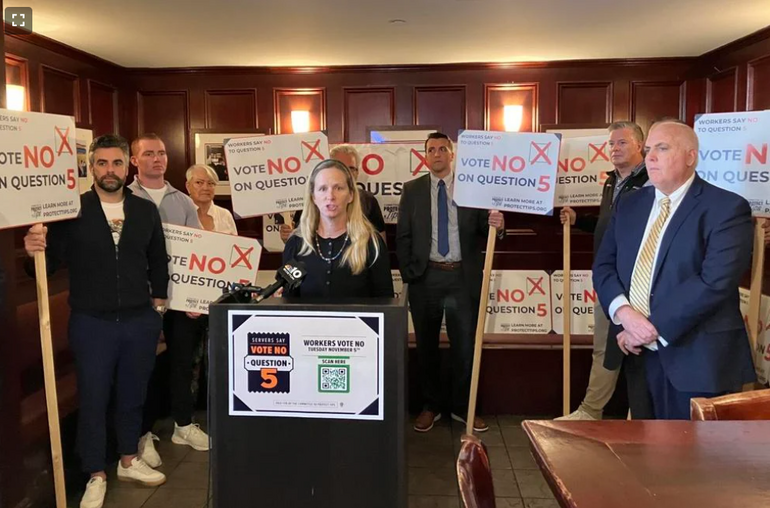Workers will be laid off and menu prices will skyrocket should voters approve a ballot question to eliminate the tipped-wage structure, an employee from one of the state’s oldest Irish bars said Monday.
Boston City Councilors Ed Flynn, John FitzGerald and Erin Murphy voiced their opposition to Question 5, which would gradually phase out lower tipped wages and bring restaurant workers up to the full minimum wage, at J.J. Foley’s Cafe, where Flynn’s nephew is a marketing manager and bartender. They were joined by Steve Clark, CEO of the Massachusetts Restaurant Association, who said passage of the question would be a “disaster for the restaurant industry.”
Outside the South End establishment, about 10 tipped workers and supporters with the One Fair Wage campaign rallied in favor of the measure, dismissing concerns that the question could devastate the restaurant industry and harm the waiters and bartenders they’re seeking to protect.
“We haven’t specifically got to what our cuts will mean, but absolutely layoffs would have to occur,” said Michael Foley, Flynn’s nephew, who also predicted a spike in prices. “Local neighborhood people that come in here two, three times a week, they’re no longer going to be able to afford to go to dinner and support our businesses. And you’re really talking about a major economic recession for the restaurant industry.”
Foley said the bar has about 15 to 18 employees, including 10 of whom earn tips.
Flynn, who gave a shout-out to his nephew, said waitresses rely on tips to support their families.
“They’re not wealthy, but they’re working as hard as they possibly can to put food on their table for their kids, to pay their bills, to pay their tuition bills,” Flynn said. “So let’s stand with our restaurant owners. Let’s stand with our workers and ensure that they’re treated with respect, they’re treated with dignity.”
Tipped workers currently earn an hourly wage of $6.75. If they do not earn the full minimum wage of $15 per hour through tips, their employer is required to make up the difference.
The ballot question, if approved, would scrap the tipped-wage structure over a five-year period, and restaurant owners would gain the option to create a tip pool with back-of-the-house workers who don’t interact with customers.
Gov. Maura Healey said last week she feels “really strongly” about her opposition to Question 5. In a statement Monday, Sen. John Velis said he’s “vehemently” opposed too, saying “it will have catastrophic economic consequences” and “hurt tipped workers, small businesses, and our entire restaurant industry.”
Question 5 critics warn that customers may stop or cut back on tipping, meaning workers could ultimately end up earning less than they do now. But Erica Thomas, a tipped worker who wore a hot pink shirt representing the One Fair Wage campaign, claimed the question won’t change tipping culture or thwart customers from dining out.
“We saw through COVID how prices were jacked up and people still went out to eat, people still tipped their servers. Nothing’s going to change about that,” Thomas said outside J.J. Foley’s. “If people still think that people have done a great job, they’re still going to tip them. And at the end of the day, there’s lots of people who still don’t tip today, even though servers aren’t receiving a livable wage, and that tip is subsidizing their wage.”
As Thomas and other supporters see it, Question 5 is intended to ensure workers earn a livable wage, and that they are protected from harassment and wage theft.
Murphy, a former waitress, said all of the restaurant workers she’s consulted are against the question since they worry their livelihoods are in jeopardy.
“And we know that in the city, we’re spending a lot of money supporting our small businesses and getting our restaurants and our businesses back up after the COVID pandemic. Knowing that we need to get people back into downtown, back into the restaurant neighborhoods, and at the same time, now we’re going to risk having people question, ‘Can I afford it if the prices are going to be even higher?'” Murphy said.
Murphy urged Bay Staters to join with restaurant owners and workers in voting no.
“They’re our small business owners, they’re our residents, they’re our neighbors, and we have to make sure we support them,” she said.
Foley pointed to a disconnect between the ballot question and the new law giving the city 225 more alcohol licenses, which are slated to boost economic opportunity in 13 targeted ZIP codes, including in underserved neighborhoods.
“These 225 liquor licenses were just created by our state and city officials to help the barrier to entry in these disenfranchised communities lessen, and that is going to be the complete opposite,” Foley said. “You might as well not even make the 225 liquor licenses now with the effect of yes on 5. So stand with existing restaurants, but also stand with people that have a dream to open and work in this industry, open up their own restaurant, and stand with them and vote no on Question 5.”
FitzGerald said constituents in his district, which includes Dorchester and part of the South End, are “overwhelmingly” against Question 5.
“This isn’t a bipartisan issue. This is a math issue,” FitzGerald said as he explained his opposition. “And the math issue is: This will be better for the workers, that they collect their tips. This will be better for the consumer. We’re used to what this is and there’s no use in changing something that isn’t broken.”

